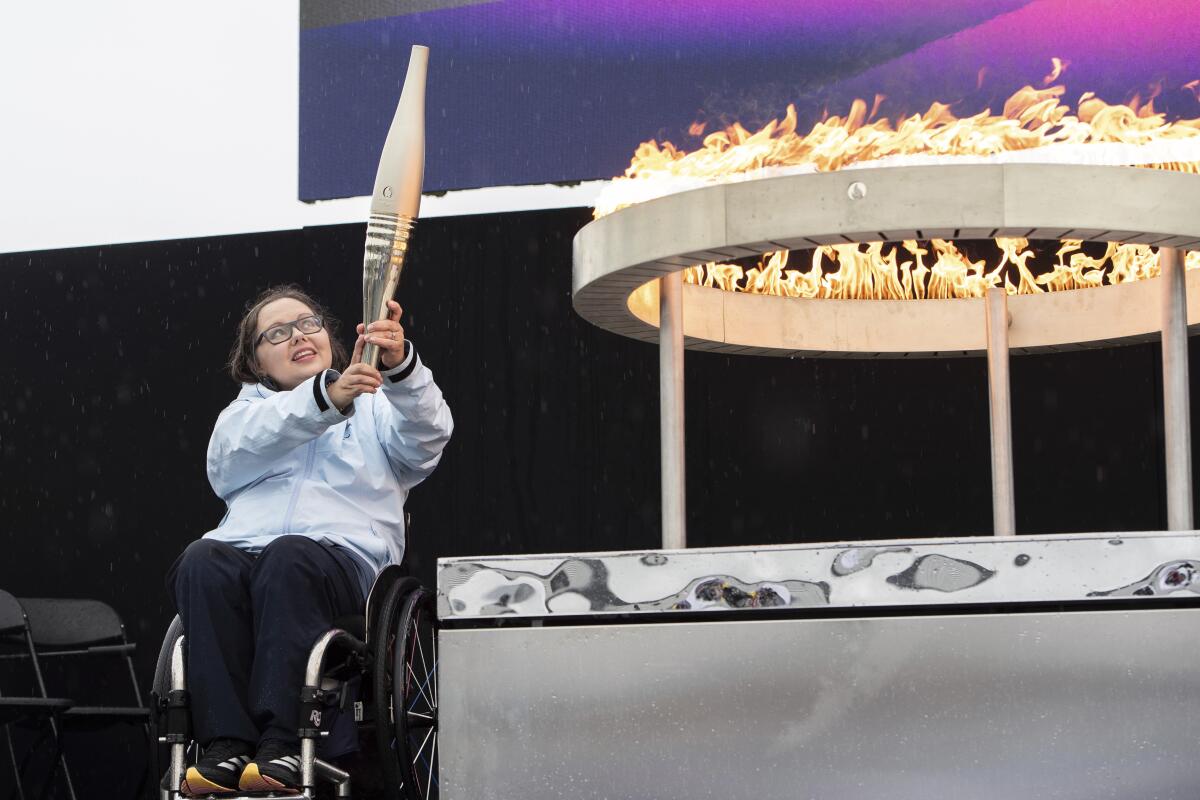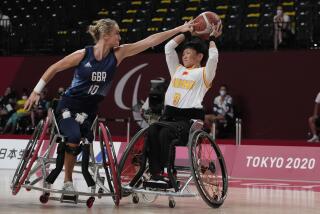Under sea and over land, the Paris Paralympics flame is lit and on a unique journey

- Share via
Two weeks after French star swimmer Léon Marchand extinguished the Olympic flame to close the Paris Olympics, the spotlight is now on its Paralympic counterpart.
British Paralympians Helene Raynsford and Gregor Ewan on Saturday lit the flame in Stoke Mandeville, a village northwest of London widely considered the birthplace of the Paralympic Games.
The flame then began a trip to France under the English Channel during a four-day relay from Atlantic Ocean shores to Mediterranean beaches, from the Pyrenees to the Alps.
Its journey will end in Paris on Wednesday during the Paralympics opening ceremony — with the lighting of a unique Olympic cauldron attached to a hot-air balloon that will fly over the French capital every evening during 11 days of competition.
The flame is lit
The lighting ceremony of the Paralympic Heritage Flame was held in Buckinghamshire, where the Stoke Mandeville Games were first held in 1948 for a small group of wheelchair athletes who had sustained spinal injuries during World War II.
The man behind the idea was Ludwig Guttmann, a Jewish neurosurgeon who fled Nazi Germany and worked at Britain’s Stoke Mandeville hospital. At the time, suffering a spinal injury was considered a death sentence, and patients were discouraged from moving. Guttmann made the patients sit up and work muscles, and hit upon competition as way to keep them motivated.
“I don’t know about you guys, but I can feel his presence here today, no doubt about it,” said Andrew Parsons, the president of the International Paralympic Committee, at Saturday’s lighting ceremony, referring to Guttmann.
The president of the Paris 2024 organizing committee, Tony Estanguet, said that two weeks after closing the Summer Olympics, the French capital was “proud and excited” to host the 17th edition of the Summer Paralympics, the first ever for France.
We are “ready to make it unique and memorable for France and the whole world,” Estanguet said.
The Stoke Mandeville Games later grew into the first Paralympic Games, which took place in Rome in 1960. The Heritage Flame ceremony in Stoke Mandeville was first held ahead of the London Paralympics in 2012.
Crossing the Channel
The flame on Sunday crossed the sea like its Olympic twin did when it arrived in France from Greece in May — but this time via the Channel Tunnel to mark the start of the Paralympic relay.
A group of 24 British athletes embarked on the underwater journey through the 30-mile-long tunnel. Midway through, they handed over the flame to 24 French athletes, who brought it ashore in Calais. It was then used to light 12 torches, symbolizing 11 days of competition and the opening ceremony.
4 days, 1,000 torchbearers and 50 cities
Once on French soil, the flame’s 12 offshoots are heading in different directions to kick off the Paris Olympics’ encore and rekindle enthusiasm for the Games.
Among 1,000 torchbearers will be former Paralympians, young para athletes, volunteers from Paralympic federations, innovators of advanced technological support, people who dedicate their lives to others with impairments and people who work in the nonprofit sector to support caregivers.
They will take the flame to 50 cities across the country to highlight communities that are committed to promoting inclusion in sport and building awareness of living with disabilities.
An exceptional flame was scheduled to be lit in Paris on Sunday to commemorate the 80th anniversary of the liberation of the French capital from Nazi Germany occupation during World War II.
Highlighting para sport infrastructure
The relay will highlight places that are committed to developing para sports, as well as places where famous Paralympians grew up, such as Lorient, home of double Paralympic sailing gold medalist Damien Seguin. It will also stop in Blois, which has a sports complex named after its Paralympic track athlete Marie-Amélie Le Fur, who has nine medals, including two golds from Rio.
The relay will go through Châlons-en-Champagne, which has the only gymnasium in France designed to facilitate access to sport for people with intellectual disabilities. And Rouen, Chartres and Troyes, which offer a range of disciplines, including sledge hockey, para tennis, para triathlon, adapted baseball and para climbing.
The flame will stop in Chambly, which, with its three sports facilities adapted for para sports, has served as a training camp location alongside Deauville and Antibes.
The cauldron returns
On Wednesday, during the three-hour opening show, the 12 flames will again become one in the cauldron when the relay ends in central Paris after visiting historical sites along the city’s famed boulevards and plazas before lightening the cauldron during the three-hour opening show.
The cauldron is the first in Olympic history to light up without the use of fossil fuels. It uses water and electric light and is attached to a balloon. It made a first flight at the Olympics’ opening ceremony.
Each day of the Paralympics, the cauldron will fly more than 60 meters (197 feet) above the Tuileries gardens from sunset until 2 a.m.
Surk writes for the Associated Press.
More to Read
Go beyond the scoreboard
Get the latest on L.A.'s teams in the daily Sports Report newsletter.
You may occasionally receive promotional content from the Los Angeles Times.






